Throne of Blood: Akira Kurosawa's Adaptation of Shakespeare's Macbeth
VerifiedAdded on 2021/04/17
|11
|2689
|106
Essay
AI Summary
This essay provides a comprehensive analysis of Akira Kurosawa's film, Throne of Blood, as an adaptation of William Shakespeare's play, Macbeth. The essay delves into the transformation of the setting from Medieval Scotland to Feudal Japan, highlighting the film's intelligent portrayal of the play's themes and characters. It explores the similarities in the opening scenes, the contrasting characterizations of the protagonists, and the use of symbolism, particularly the spider's web castle. The essay also examines the film's success in adapting the original text, including the influence of Japanese culture, the portrayal of guilt and shame, and the exceptional performance of Toshiro Mifune. Furthermore, it compares the roles of Lady Macbeth and Lady Asaji, the techniques employed in both the play and the film, such as soliloquies and Noh theatre, and the significance of superstition and imagery. The essay concludes by emphasizing the differences in character reactions to the prophecies and the overall brilliance of Kurosawa's interpretation.
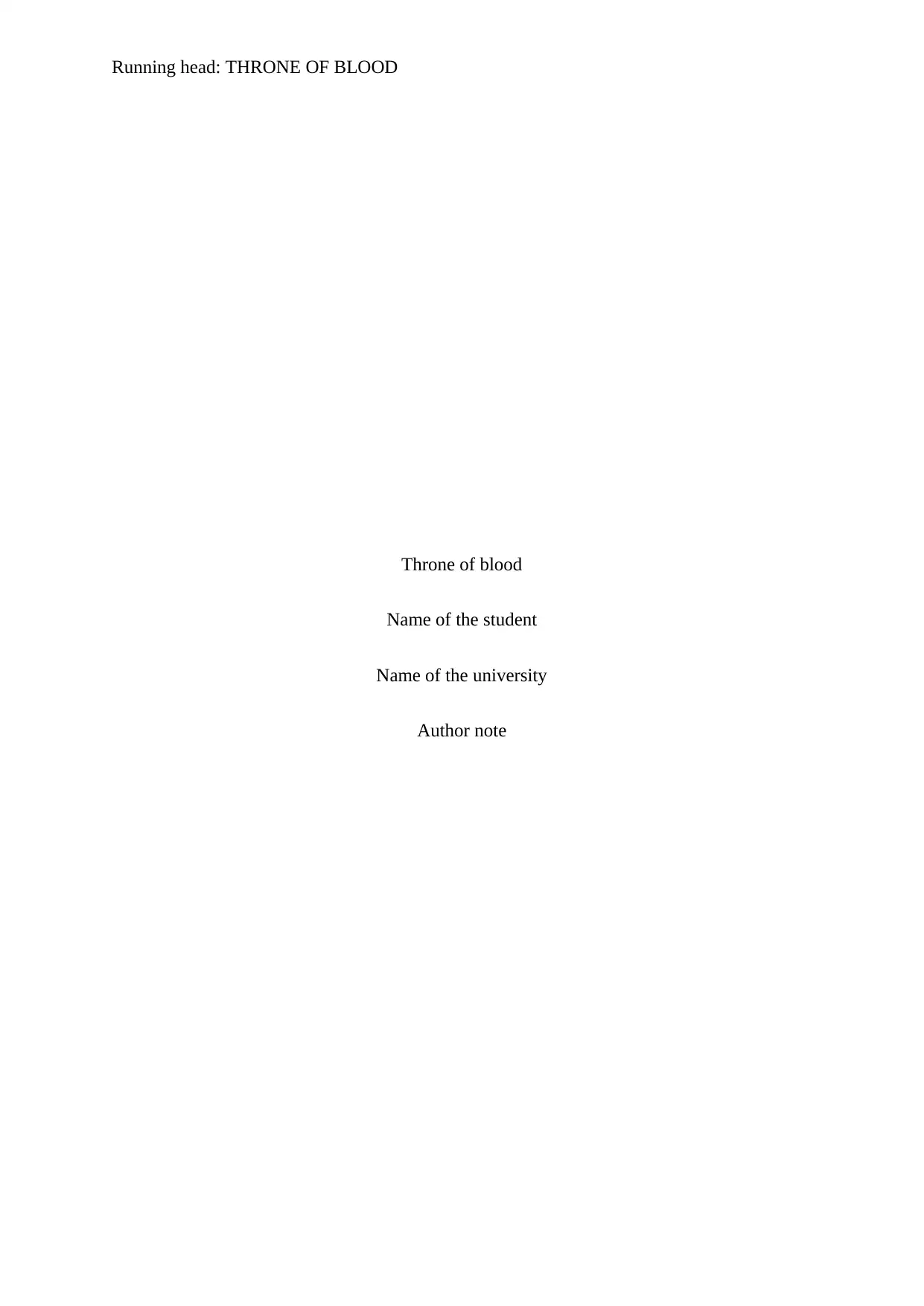
Running head: THRONE OF BLOOD
Throne of blood
Name of the student
Name of the university
Author note
Throne of blood
Name of the student
Name of the university
Author note
Paraphrase This Document
Need a fresh take? Get an instant paraphrase of this document with our AI Paraphraser
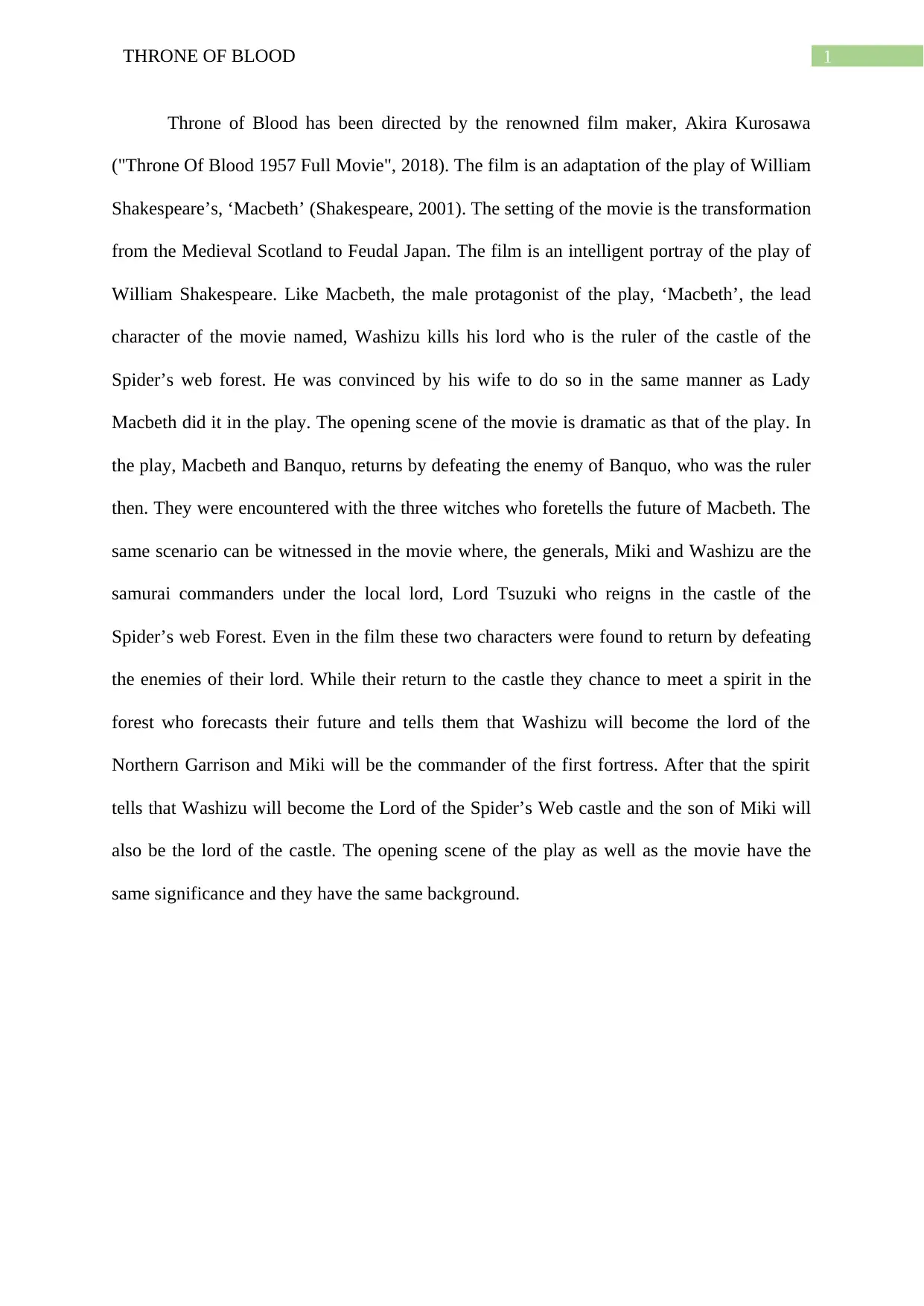
1THRONE OF BLOOD
Throne of Blood has been directed by the renowned film maker, Akira Kurosawa
("Throne Of Blood 1957 Full Movie", 2018). The film is an adaptation of the play of William
Shakespeare’s, ‘Macbeth’ (Shakespeare, 2001). The setting of the movie is the transformation
from the Medieval Scotland to Feudal Japan. The film is an intelligent portray of the play of
William Shakespeare. Like Macbeth, the male protagonist of the play, ‘Macbeth’, the lead
character of the movie named, Washizu kills his lord who is the ruler of the castle of the
Spider’s web forest. He was convinced by his wife to do so in the same manner as Lady
Macbeth did it in the play. The opening scene of the movie is dramatic as that of the play. In
the play, Macbeth and Banquo, returns by defeating the enemy of Banquo, who was the ruler
then. They were encountered with the three witches who foretells the future of Macbeth. The
same scenario can be witnessed in the movie where, the generals, Miki and Washizu are the
samurai commanders under the local lord, Lord Tsuzuki who reigns in the castle of the
Spider’s web Forest. Even in the film these two characters were found to return by defeating
the enemies of their lord. While their return to the castle they chance to meet a spirit in the
forest who forecasts their future and tells them that Washizu will become the lord of the
Northern Garrison and Miki will be the commander of the first fortress. After that the spirit
tells that Washizu will become the Lord of the Spider’s Web castle and the son of Miki will
also be the lord of the castle. The opening scene of the play as well as the movie have the
same significance and they have the same background.
Throne of Blood has been directed by the renowned film maker, Akira Kurosawa
("Throne Of Blood 1957 Full Movie", 2018). The film is an adaptation of the play of William
Shakespeare’s, ‘Macbeth’ (Shakespeare, 2001). The setting of the movie is the transformation
from the Medieval Scotland to Feudal Japan. The film is an intelligent portray of the play of
William Shakespeare. Like Macbeth, the male protagonist of the play, ‘Macbeth’, the lead
character of the movie named, Washizu kills his lord who is the ruler of the castle of the
Spider’s web forest. He was convinced by his wife to do so in the same manner as Lady
Macbeth did it in the play. The opening scene of the movie is dramatic as that of the play. In
the play, Macbeth and Banquo, returns by defeating the enemy of Banquo, who was the ruler
then. They were encountered with the three witches who foretells the future of Macbeth. The
same scenario can be witnessed in the movie where, the generals, Miki and Washizu are the
samurai commanders under the local lord, Lord Tsuzuki who reigns in the castle of the
Spider’s web Forest. Even in the film these two characters were found to return by defeating
the enemies of their lord. While their return to the castle they chance to meet a spirit in the
forest who forecasts their future and tells them that Washizu will become the lord of the
Northern Garrison and Miki will be the commander of the first fortress. After that the spirit
tells that Washizu will become the Lord of the Spider’s Web castle and the son of Miki will
also be the lord of the castle. The opening scene of the play as well as the movie have the
same significance and they have the same background.
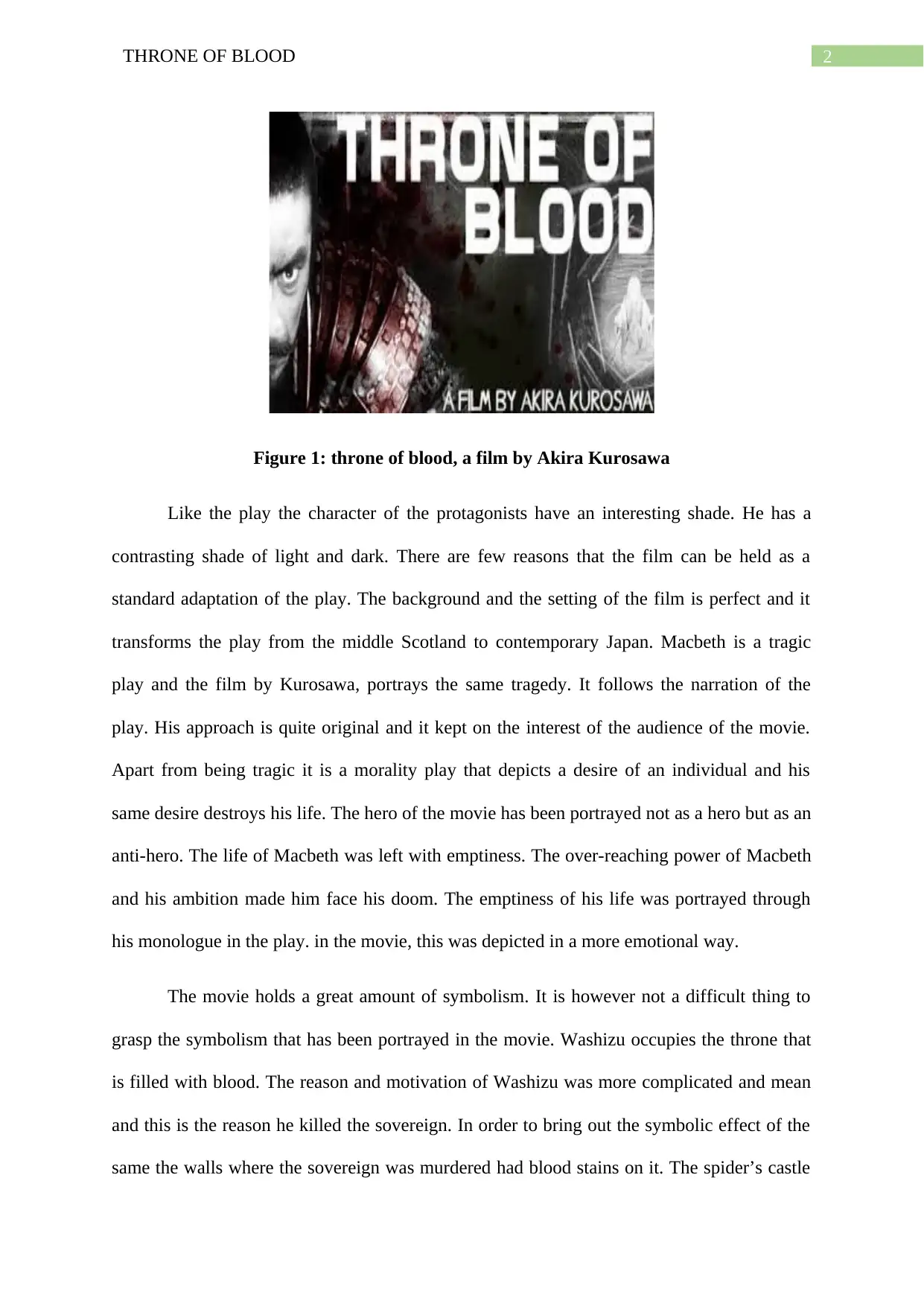
2THRONE OF BLOOD
Figure 1: throne of blood, a film by Akira Kurosawa
Like the play the character of the protagonists have an interesting shade. He has a
contrasting shade of light and dark. There are few reasons that the film can be held as a
standard adaptation of the play. The background and the setting of the film is perfect and it
transforms the play from the middle Scotland to contemporary Japan. Macbeth is a tragic
play and the film by Kurosawa, portrays the same tragedy. It follows the narration of the
play. His approach is quite original and it kept on the interest of the audience of the movie.
Apart from being tragic it is a morality play that depicts a desire of an individual and his
same desire destroys his life. The hero of the movie has been portrayed not as a hero but as an
anti-hero. The life of Macbeth was left with emptiness. The over-reaching power of Macbeth
and his ambition made him face his doom. The emptiness of his life was portrayed through
his monologue in the play. in the movie, this was depicted in a more emotional way.
The movie holds a great amount of symbolism. It is however not a difficult thing to
grasp the symbolism that has been portrayed in the movie. Washizu occupies the throne that
is filled with blood. The reason and motivation of Washizu was more complicated and mean
and this is the reason he killed the sovereign. In order to bring out the symbolic effect of the
same the walls where the sovereign was murdered had blood stains on it. The spider’s castle
Figure 1: throne of blood, a film by Akira Kurosawa
Like the play the character of the protagonists have an interesting shade. He has a
contrasting shade of light and dark. There are few reasons that the film can be held as a
standard adaptation of the play. The background and the setting of the film is perfect and it
transforms the play from the middle Scotland to contemporary Japan. Macbeth is a tragic
play and the film by Kurosawa, portrays the same tragedy. It follows the narration of the
play. His approach is quite original and it kept on the interest of the audience of the movie.
Apart from being tragic it is a morality play that depicts a desire of an individual and his
same desire destroys his life. The hero of the movie has been portrayed not as a hero but as an
anti-hero. The life of Macbeth was left with emptiness. The over-reaching power of Macbeth
and his ambition made him face his doom. The emptiness of his life was portrayed through
his monologue in the play. in the movie, this was depicted in a more emotional way.
The movie holds a great amount of symbolism. It is however not a difficult thing to
grasp the symbolism that has been portrayed in the movie. Washizu occupies the throne that
is filled with blood. The reason and motivation of Washizu was more complicated and mean
and this is the reason he killed the sovereign. In order to bring out the symbolic effect of the
same the walls where the sovereign was murdered had blood stains on it. The spider’s castle
⊘ This is a preview!⊘
Do you want full access?
Subscribe today to unlock all pages.

Trusted by 1+ million students worldwide
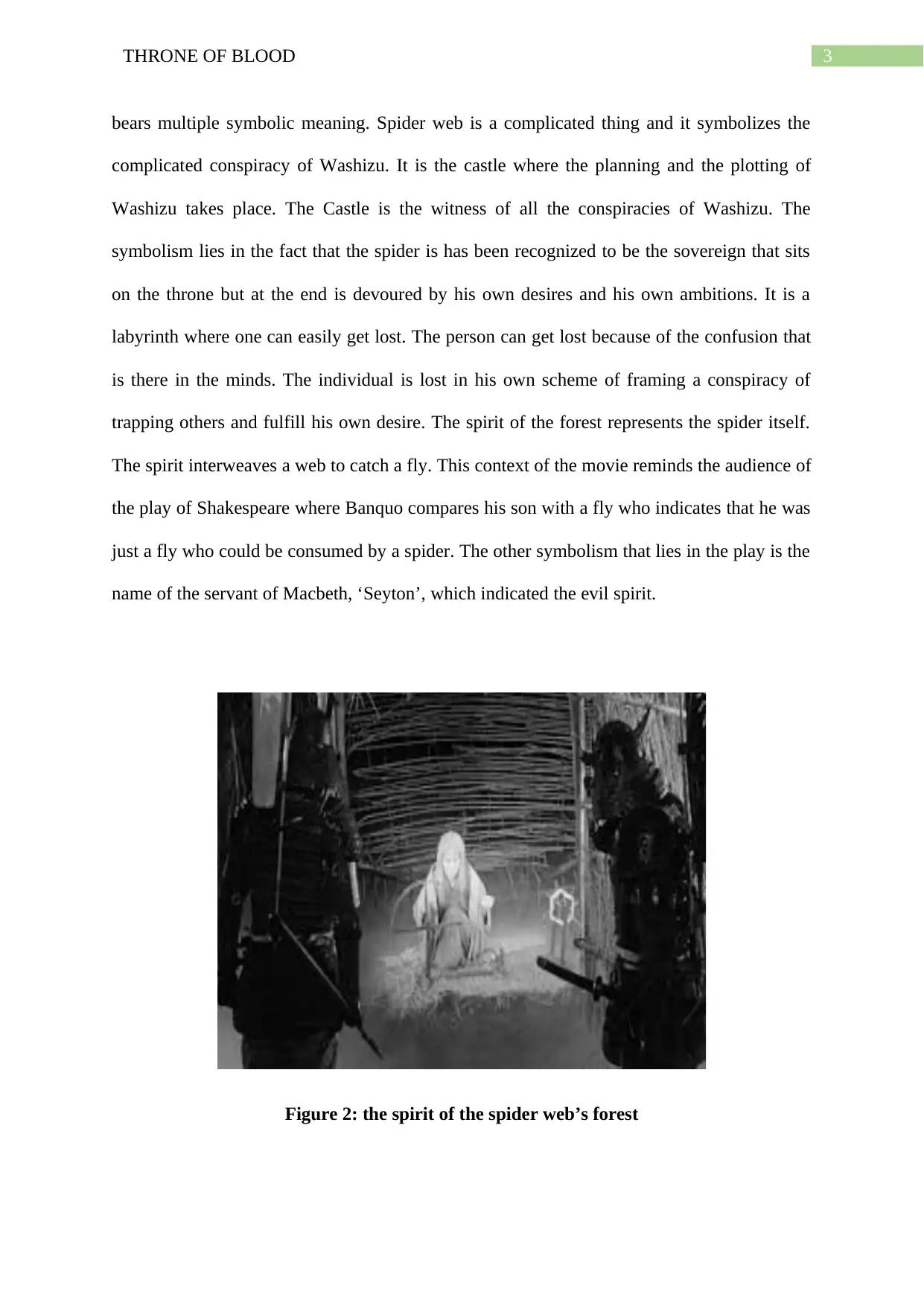
3THRONE OF BLOOD
bears multiple symbolic meaning. Spider web is a complicated thing and it symbolizes the
complicated conspiracy of Washizu. It is the castle where the planning and the plotting of
Washizu takes place. The Castle is the witness of all the conspiracies of Washizu. The
symbolism lies in the fact that the spider is has been recognized to be the sovereign that sits
on the throne but at the end is devoured by his own desires and his own ambitions. It is a
labyrinth where one can easily get lost. The person can get lost because of the confusion that
is there in the minds. The individual is lost in his own scheme of framing a conspiracy of
trapping others and fulfill his own desire. The spirit of the forest represents the spider itself.
The spirit interweaves a web to catch a fly. This context of the movie reminds the audience of
the play of Shakespeare where Banquo compares his son with a fly who indicates that he was
just a fly who could be consumed by a spider. The other symbolism that lies in the play is the
name of the servant of Macbeth, ‘Seyton’, which indicated the evil spirit.
Figure 2: the spirit of the spider web’s forest
bears multiple symbolic meaning. Spider web is a complicated thing and it symbolizes the
complicated conspiracy of Washizu. It is the castle where the planning and the plotting of
Washizu takes place. The Castle is the witness of all the conspiracies of Washizu. The
symbolism lies in the fact that the spider is has been recognized to be the sovereign that sits
on the throne but at the end is devoured by his own desires and his own ambitions. It is a
labyrinth where one can easily get lost. The person can get lost because of the confusion that
is there in the minds. The individual is lost in his own scheme of framing a conspiracy of
trapping others and fulfill his own desire. The spirit of the forest represents the spider itself.
The spirit interweaves a web to catch a fly. This context of the movie reminds the audience of
the play of Shakespeare where Banquo compares his son with a fly who indicates that he was
just a fly who could be consumed by a spider. The other symbolism that lies in the play is the
name of the servant of Macbeth, ‘Seyton’, which indicated the evil spirit.
Figure 2: the spirit of the spider web’s forest
Paraphrase This Document
Need a fresh take? Get an instant paraphrase of this document with our AI Paraphraser
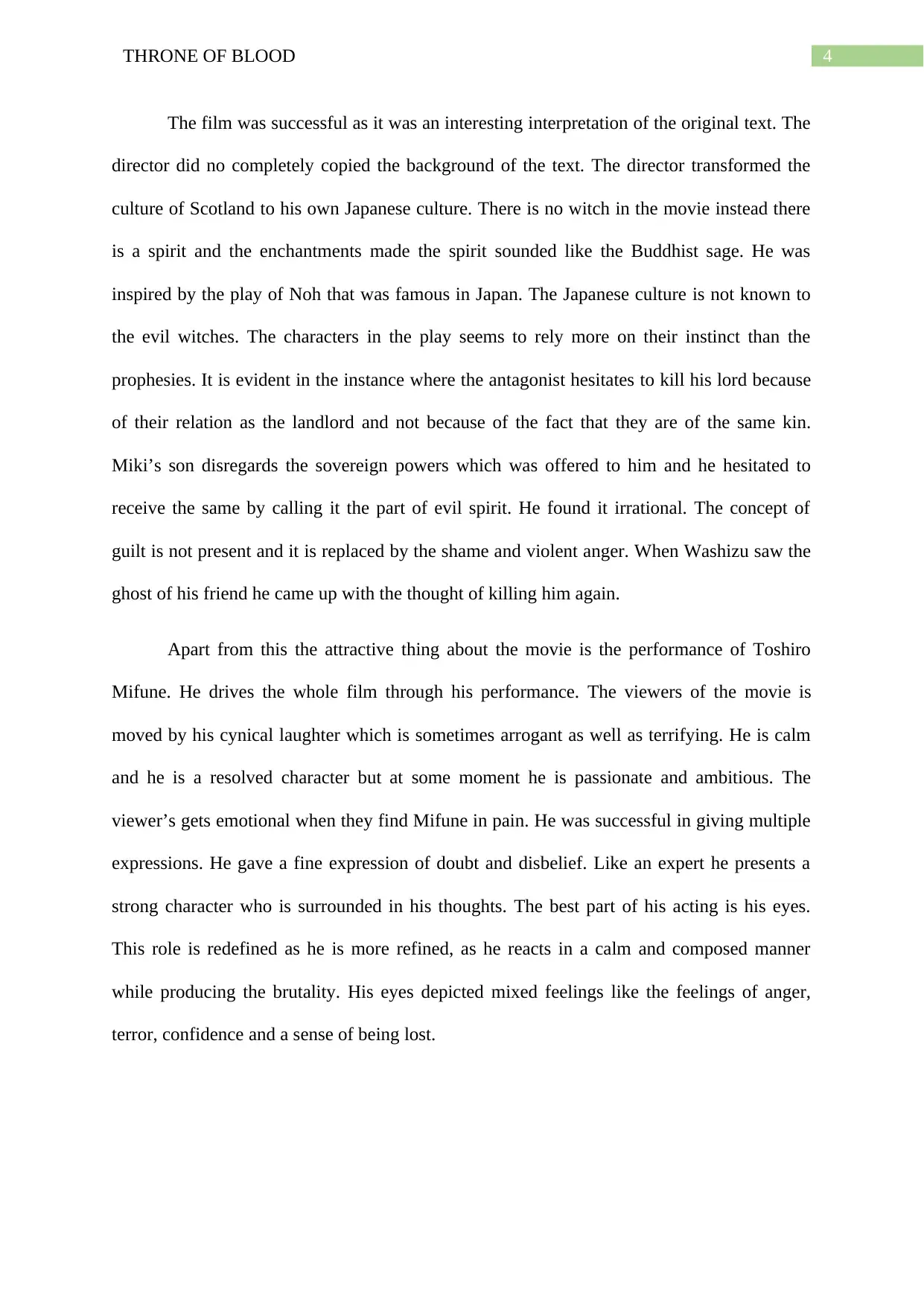
4THRONE OF BLOOD
The film was successful as it was an interesting interpretation of the original text. The
director did no completely copied the background of the text. The director transformed the
culture of Scotland to his own Japanese culture. There is no witch in the movie instead there
is a spirit and the enchantments made the spirit sounded like the Buddhist sage. He was
inspired by the play of Noh that was famous in Japan. The Japanese culture is not known to
the evil witches. The characters in the play seems to rely more on their instinct than the
prophesies. It is evident in the instance where the antagonist hesitates to kill his lord because
of their relation as the landlord and not because of the fact that they are of the same kin.
Miki’s son disregards the sovereign powers which was offered to him and he hesitated to
receive the same by calling it the part of evil spirit. He found it irrational. The concept of
guilt is not present and it is replaced by the shame and violent anger. When Washizu saw the
ghost of his friend he came up with the thought of killing him again.
Apart from this the attractive thing about the movie is the performance of Toshiro
Mifune. He drives the whole film through his performance. The viewers of the movie is
moved by his cynical laughter which is sometimes arrogant as well as terrifying. He is calm
and he is a resolved character but at some moment he is passionate and ambitious. The
viewer’s gets emotional when they find Mifune in pain. He was successful in giving multiple
expressions. He gave a fine expression of doubt and disbelief. Like an expert he presents a
strong character who is surrounded in his thoughts. The best part of his acting is his eyes.
This role is redefined as he is more refined, as he reacts in a calm and composed manner
while producing the brutality. His eyes depicted mixed feelings like the feelings of anger,
terror, confidence and a sense of being lost.
The film was successful as it was an interesting interpretation of the original text. The
director did no completely copied the background of the text. The director transformed the
culture of Scotland to his own Japanese culture. There is no witch in the movie instead there
is a spirit and the enchantments made the spirit sounded like the Buddhist sage. He was
inspired by the play of Noh that was famous in Japan. The Japanese culture is not known to
the evil witches. The characters in the play seems to rely more on their instinct than the
prophesies. It is evident in the instance where the antagonist hesitates to kill his lord because
of their relation as the landlord and not because of the fact that they are of the same kin.
Miki’s son disregards the sovereign powers which was offered to him and he hesitated to
receive the same by calling it the part of evil spirit. He found it irrational. The concept of
guilt is not present and it is replaced by the shame and violent anger. When Washizu saw the
ghost of his friend he came up with the thought of killing him again.
Apart from this the attractive thing about the movie is the performance of Toshiro
Mifune. He drives the whole film through his performance. The viewers of the movie is
moved by his cynical laughter which is sometimes arrogant as well as terrifying. He is calm
and he is a resolved character but at some moment he is passionate and ambitious. The
viewer’s gets emotional when they find Mifune in pain. He was successful in giving multiple
expressions. He gave a fine expression of doubt and disbelief. Like an expert he presents a
strong character who is surrounded in his thoughts. The best part of his acting is his eyes.
This role is redefined as he is more refined, as he reacts in a calm and composed manner
while producing the brutality. His eyes depicted mixed feelings like the feelings of anger,
terror, confidence and a sense of being lost.
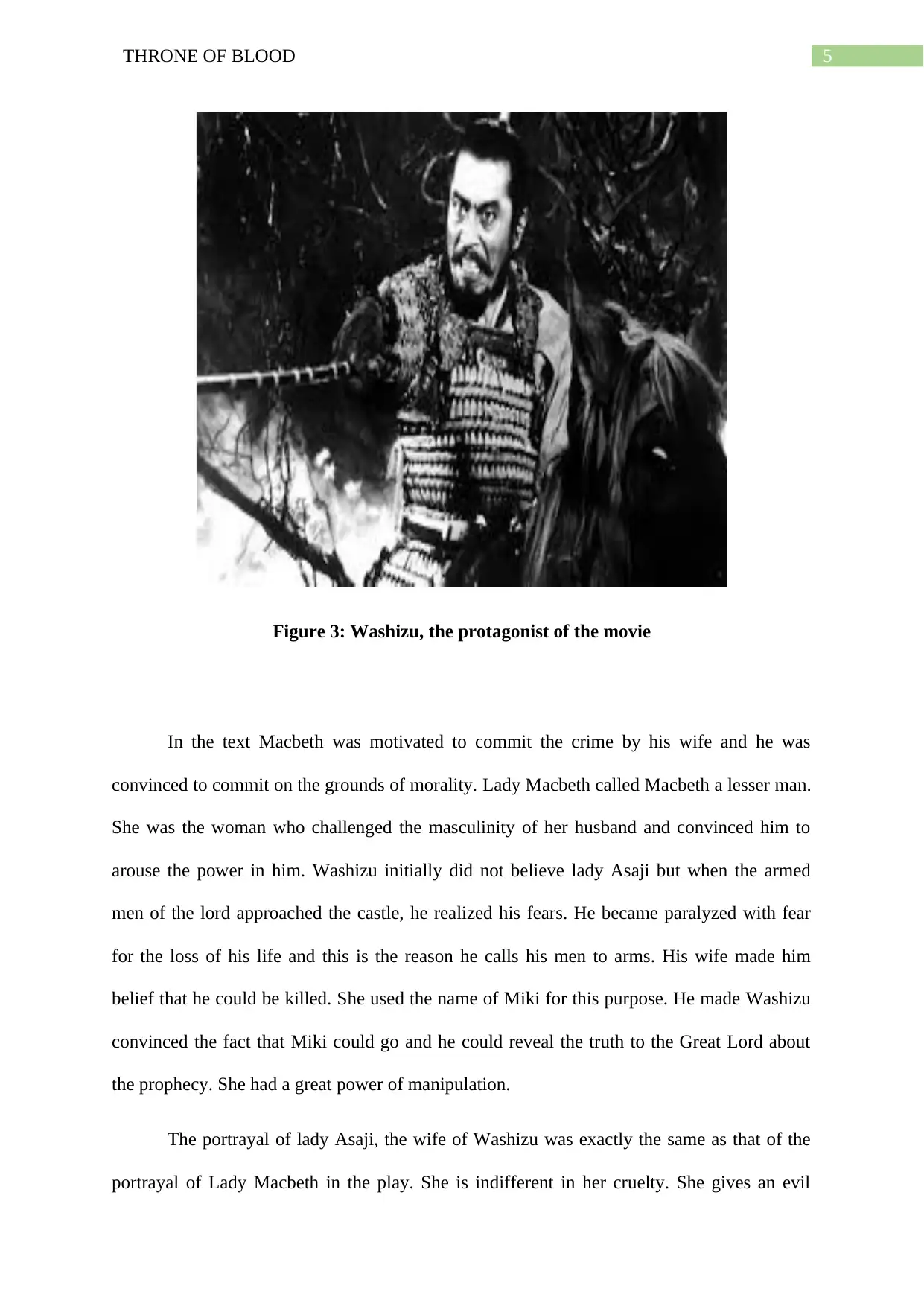
5THRONE OF BLOOD
Figure 3: Washizu, the protagonist of the movie
In the text Macbeth was motivated to commit the crime by his wife and he was
convinced to commit on the grounds of morality. Lady Macbeth called Macbeth a lesser man.
She was the woman who challenged the masculinity of her husband and convinced him to
arouse the power in him. Washizu initially did not believe lady Asaji but when the armed
men of the lord approached the castle, he realized his fears. He became paralyzed with fear
for the loss of his life and this is the reason he calls his men to arms. His wife made him
belief that he could be killed. She used the name of Miki for this purpose. He made Washizu
convinced the fact that Miki could go and he could reveal the truth to the Great Lord about
the prophecy. She had a great power of manipulation.
The portrayal of lady Asaji, the wife of Washizu was exactly the same as that of the
portrayal of Lady Macbeth in the play. She is indifferent in her cruelty. She gives an evil
Figure 3: Washizu, the protagonist of the movie
In the text Macbeth was motivated to commit the crime by his wife and he was
convinced to commit on the grounds of morality. Lady Macbeth called Macbeth a lesser man.
She was the woman who challenged the masculinity of her husband and convinced him to
arouse the power in him. Washizu initially did not believe lady Asaji but when the armed
men of the lord approached the castle, he realized his fears. He became paralyzed with fear
for the loss of his life and this is the reason he calls his men to arms. His wife made him
belief that he could be killed. She used the name of Miki for this purpose. He made Washizu
convinced the fact that Miki could go and he could reveal the truth to the Great Lord about
the prophecy. She had a great power of manipulation.
The portrayal of lady Asaji, the wife of Washizu was exactly the same as that of the
portrayal of Lady Macbeth in the play. She is indifferent in her cruelty. She gives an evil
⊘ This is a preview!⊘
Do you want full access?
Subscribe today to unlock all pages.

Trusted by 1+ million students worldwide
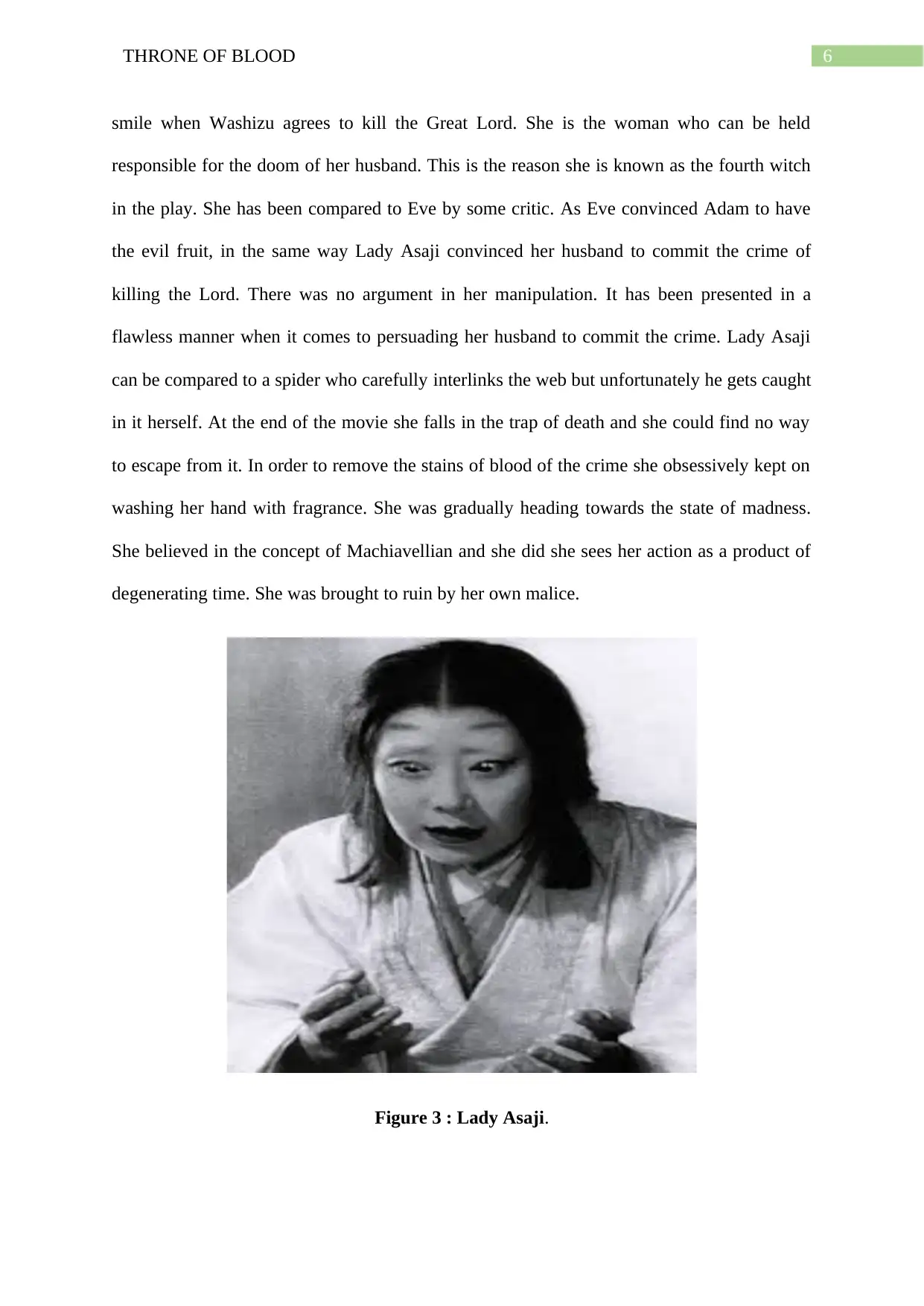
6THRONE OF BLOOD
smile when Washizu agrees to kill the Great Lord. She is the woman who can be held
responsible for the doom of her husband. This is the reason she is known as the fourth witch
in the play. She has been compared to Eve by some critic. As Eve convinced Adam to have
the evil fruit, in the same way Lady Asaji convinced her husband to commit the crime of
killing the Lord. There was no argument in her manipulation. It has been presented in a
flawless manner when it comes to persuading her husband to commit the crime. Lady Asaji
can be compared to a spider who carefully interlinks the web but unfortunately he gets caught
in it herself. At the end of the movie she falls in the trap of death and she could find no way
to escape from it. In order to remove the stains of blood of the crime she obsessively kept on
washing her hand with fragrance. She was gradually heading towards the state of madness.
She believed in the concept of Machiavellian and she did she sees her action as a product of
degenerating time. She was brought to ruin by her own malice.
Figure 3 : Lady Asaji.
smile when Washizu agrees to kill the Great Lord. She is the woman who can be held
responsible for the doom of her husband. This is the reason she is known as the fourth witch
in the play. She has been compared to Eve by some critic. As Eve convinced Adam to have
the evil fruit, in the same way Lady Asaji convinced her husband to commit the crime of
killing the Lord. There was no argument in her manipulation. It has been presented in a
flawless manner when it comes to persuading her husband to commit the crime. Lady Asaji
can be compared to a spider who carefully interlinks the web but unfortunately he gets caught
in it herself. At the end of the movie she falls in the trap of death and she could find no way
to escape from it. In order to remove the stains of blood of the crime she obsessively kept on
washing her hand with fragrance. She was gradually heading towards the state of madness.
She believed in the concept of Machiavellian and she did she sees her action as a product of
degenerating time. She was brought to ruin by her own malice.
Figure 3 : Lady Asaji.
Paraphrase This Document
Need a fresh take? Get an instant paraphrase of this document with our AI Paraphraser
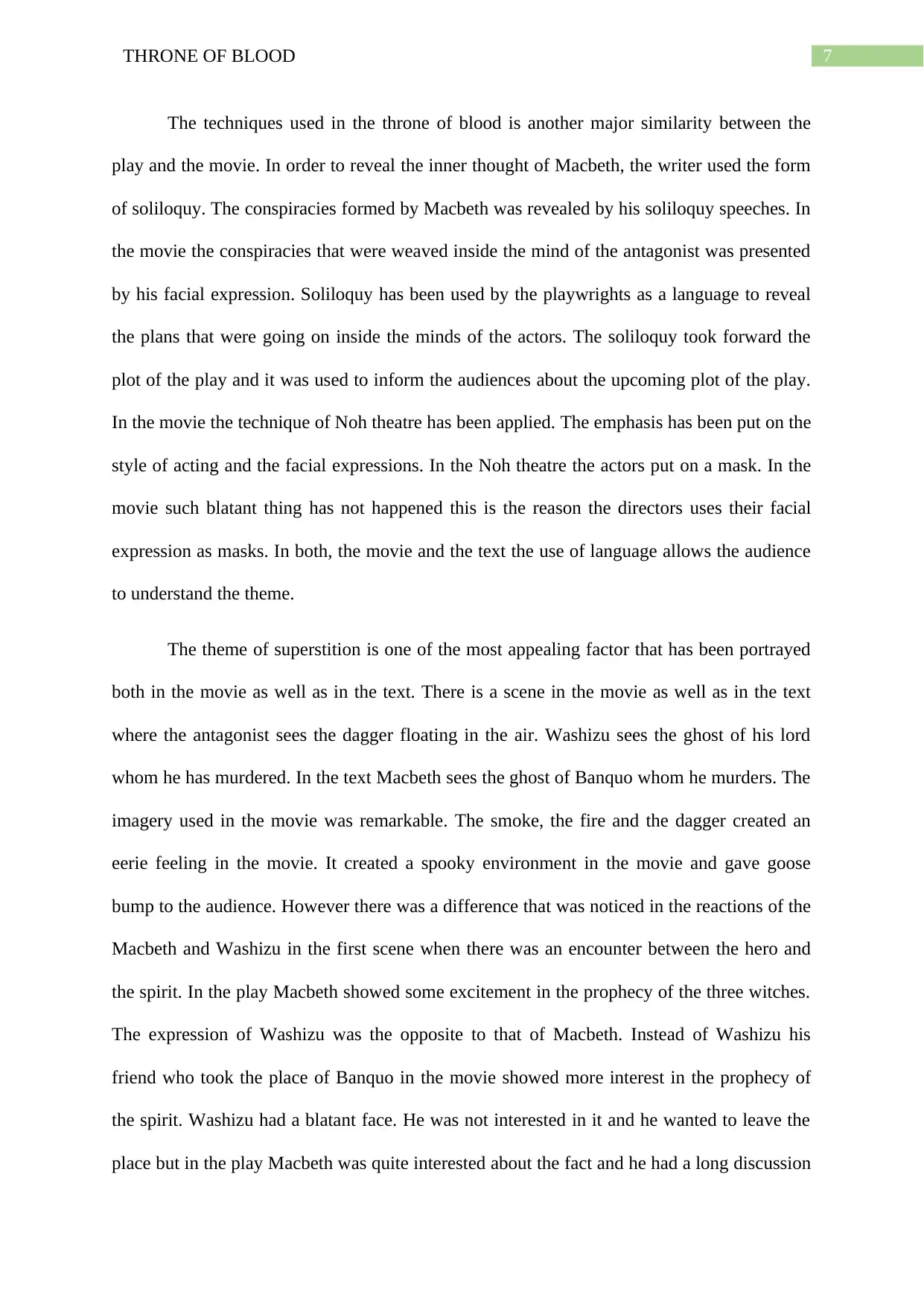
7THRONE OF BLOOD
The techniques used in the throne of blood is another major similarity between the
play and the movie. In order to reveal the inner thought of Macbeth, the writer used the form
of soliloquy. The conspiracies formed by Macbeth was revealed by his soliloquy speeches. In
the movie the conspiracies that were weaved inside the mind of the antagonist was presented
by his facial expression. Soliloquy has been used by the playwrights as a language to reveal
the plans that were going on inside the minds of the actors. The soliloquy took forward the
plot of the play and it was used to inform the audiences about the upcoming plot of the play.
In the movie the technique of Noh theatre has been applied. The emphasis has been put on the
style of acting and the facial expressions. In the Noh theatre the actors put on a mask. In the
movie such blatant thing has not happened this is the reason the directors uses their facial
expression as masks. In both, the movie and the text the use of language allows the audience
to understand the theme.
The theme of superstition is one of the most appealing factor that has been portrayed
both in the movie as well as in the text. There is a scene in the movie as well as in the text
where the antagonist sees the dagger floating in the air. Washizu sees the ghost of his lord
whom he has murdered. In the text Macbeth sees the ghost of Banquo whom he murders. The
imagery used in the movie was remarkable. The smoke, the fire and the dagger created an
eerie feeling in the movie. It created a spooky environment in the movie and gave goose
bump to the audience. However there was a difference that was noticed in the reactions of the
Macbeth and Washizu in the first scene when there was an encounter between the hero and
the spirit. In the play Macbeth showed some excitement in the prophecy of the three witches.
The expression of Washizu was the opposite to that of Macbeth. Instead of Washizu his
friend who took the place of Banquo in the movie showed more interest in the prophecy of
the spirit. Washizu had a blatant face. He was not interested in it and he wanted to leave the
place but in the play Macbeth was quite interested about the fact and he had a long discussion
The techniques used in the throne of blood is another major similarity between the
play and the movie. In order to reveal the inner thought of Macbeth, the writer used the form
of soliloquy. The conspiracies formed by Macbeth was revealed by his soliloquy speeches. In
the movie the conspiracies that were weaved inside the mind of the antagonist was presented
by his facial expression. Soliloquy has been used by the playwrights as a language to reveal
the plans that were going on inside the minds of the actors. The soliloquy took forward the
plot of the play and it was used to inform the audiences about the upcoming plot of the play.
In the movie the technique of Noh theatre has been applied. The emphasis has been put on the
style of acting and the facial expressions. In the Noh theatre the actors put on a mask. In the
movie such blatant thing has not happened this is the reason the directors uses their facial
expression as masks. In both, the movie and the text the use of language allows the audience
to understand the theme.
The theme of superstition is one of the most appealing factor that has been portrayed
both in the movie as well as in the text. There is a scene in the movie as well as in the text
where the antagonist sees the dagger floating in the air. Washizu sees the ghost of his lord
whom he has murdered. In the text Macbeth sees the ghost of Banquo whom he murders. The
imagery used in the movie was remarkable. The smoke, the fire and the dagger created an
eerie feeling in the movie. It created a spooky environment in the movie and gave goose
bump to the audience. However there was a difference that was noticed in the reactions of the
Macbeth and Washizu in the first scene when there was an encounter between the hero and
the spirit. In the play Macbeth showed some excitement in the prophecy of the three witches.
The expression of Washizu was the opposite to that of Macbeth. Instead of Washizu his
friend who took the place of Banquo in the movie showed more interest in the prophecy of
the spirit. Washizu had a blatant face. He was not interested in it and he wanted to leave the
place but in the play Macbeth was quite interested about the fact and he had a long discussion
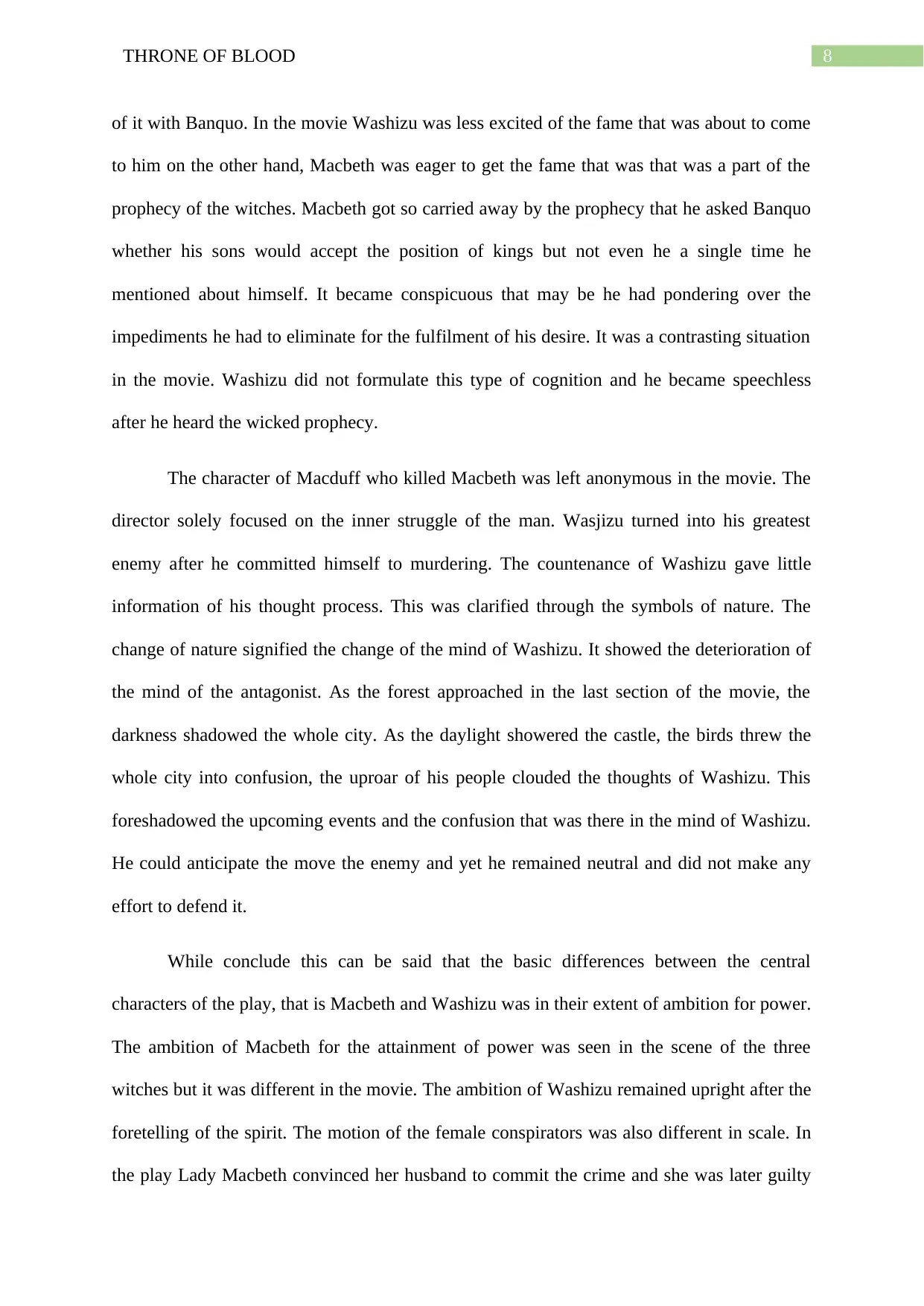
8THRONE OF BLOOD
of it with Banquo. In the movie Washizu was less excited of the fame that was about to come
to him on the other hand, Macbeth was eager to get the fame that was that was a part of the
prophecy of the witches. Macbeth got so carried away by the prophecy that he asked Banquo
whether his sons would accept the position of kings but not even he a single time he
mentioned about himself. It became conspicuous that may be he had pondering over the
impediments he had to eliminate for the fulfilment of his desire. It was a contrasting situation
in the movie. Washizu did not formulate this type of cognition and he became speechless
after he heard the wicked prophecy.
The character of Macduff who killed Macbeth was left anonymous in the movie. The
director solely focused on the inner struggle of the man. Wasjizu turned into his greatest
enemy after he committed himself to murdering. The countenance of Washizu gave little
information of his thought process. This was clarified through the symbols of nature. The
change of nature signified the change of the mind of Washizu. It showed the deterioration of
the mind of the antagonist. As the forest approached in the last section of the movie, the
darkness shadowed the whole city. As the daylight showered the castle, the birds threw the
whole city into confusion, the uproar of his people clouded the thoughts of Washizu. This
foreshadowed the upcoming events and the confusion that was there in the mind of Washizu.
He could anticipate the move the enemy and yet he remained neutral and did not make any
effort to defend it.
While conclude this can be said that the basic differences between the central
characters of the play, that is Macbeth and Washizu was in their extent of ambition for power.
The ambition of Macbeth for the attainment of power was seen in the scene of the three
witches but it was different in the movie. The ambition of Washizu remained upright after the
foretelling of the spirit. The motion of the female conspirators was also different in scale. In
the play Lady Macbeth convinced her husband to commit the crime and she was later guilty
of it with Banquo. In the movie Washizu was less excited of the fame that was about to come
to him on the other hand, Macbeth was eager to get the fame that was that was a part of the
prophecy of the witches. Macbeth got so carried away by the prophecy that he asked Banquo
whether his sons would accept the position of kings but not even he a single time he
mentioned about himself. It became conspicuous that may be he had pondering over the
impediments he had to eliminate for the fulfilment of his desire. It was a contrasting situation
in the movie. Washizu did not formulate this type of cognition and he became speechless
after he heard the wicked prophecy.
The character of Macduff who killed Macbeth was left anonymous in the movie. The
director solely focused on the inner struggle of the man. Wasjizu turned into his greatest
enemy after he committed himself to murdering. The countenance of Washizu gave little
information of his thought process. This was clarified through the symbols of nature. The
change of nature signified the change of the mind of Washizu. It showed the deterioration of
the mind of the antagonist. As the forest approached in the last section of the movie, the
darkness shadowed the whole city. As the daylight showered the castle, the birds threw the
whole city into confusion, the uproar of his people clouded the thoughts of Washizu. This
foreshadowed the upcoming events and the confusion that was there in the mind of Washizu.
He could anticipate the move the enemy and yet he remained neutral and did not make any
effort to defend it.
While conclude this can be said that the basic differences between the central
characters of the play, that is Macbeth and Washizu was in their extent of ambition for power.
The ambition of Macbeth for the attainment of power was seen in the scene of the three
witches but it was different in the movie. The ambition of Washizu remained upright after the
foretelling of the spirit. The motion of the female conspirators was also different in scale. In
the play Lady Macbeth convinced her husband to commit the crime and she was later guilty
⊘ This is a preview!⊘
Do you want full access?
Subscribe today to unlock all pages.

Trusted by 1+ million students worldwide
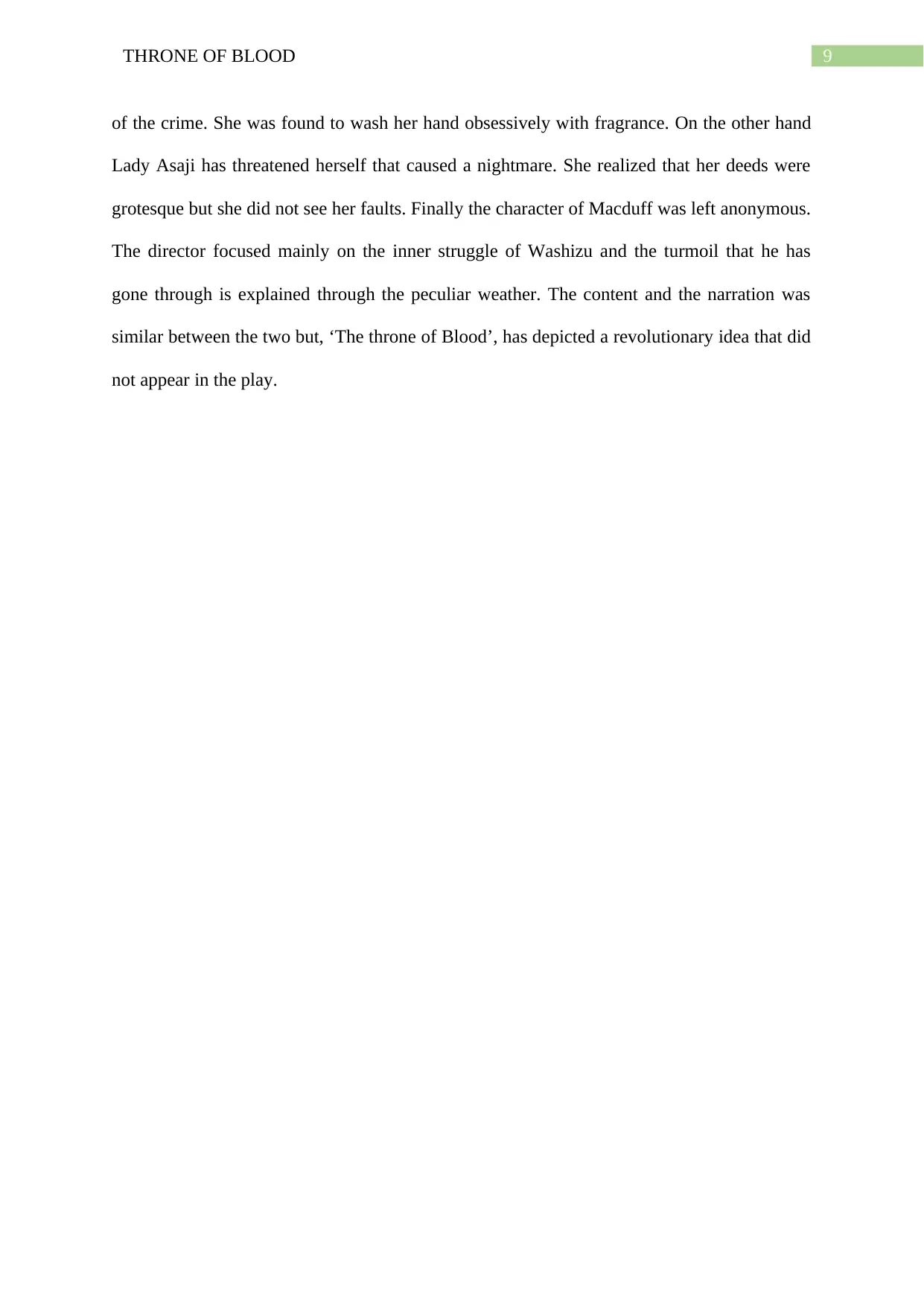
9THRONE OF BLOOD
of the crime. She was found to wash her hand obsessively with fragrance. On the other hand
Lady Asaji has threatened herself that caused a nightmare. She realized that her deeds were
grotesque but she did not see her faults. Finally the character of Macduff was left anonymous.
The director focused mainly on the inner struggle of Washizu and the turmoil that he has
gone through is explained through the peculiar weather. The content and the narration was
similar between the two but, ‘The throne of Blood’, has depicted a revolutionary idea that did
not appear in the play.
of the crime. She was found to wash her hand obsessively with fragrance. On the other hand
Lady Asaji has threatened herself that caused a nightmare. She realized that her deeds were
grotesque but she did not see her faults. Finally the character of Macduff was left anonymous.
The director focused mainly on the inner struggle of Washizu and the turmoil that he has
gone through is explained through the peculiar weather. The content and the narration was
similar between the two but, ‘The throne of Blood’, has depicted a revolutionary idea that did
not appear in the play.
Paraphrase This Document
Need a fresh take? Get an instant paraphrase of this document with our AI Paraphraser

10THRONE OF BLOOD
References
"Throne Of Blood (1957) Full Movie". 2018. Youtube. https://www.youtube.com/watch?
v=tAsfRAOy3gc&t=428s.
Shakespeare, W. (2001). The tragedy of Macbeth (Vol. 2). Classic Books Company.
References
"Throne Of Blood (1957) Full Movie". 2018. Youtube. https://www.youtube.com/watch?
v=tAsfRAOy3gc&t=428s.
Shakespeare, W. (2001). The tragedy of Macbeth (Vol. 2). Classic Books Company.
1 out of 11
Your All-in-One AI-Powered Toolkit for Academic Success.
+13062052269
info@desklib.com
Available 24*7 on WhatsApp / Email
![[object Object]](/_next/static/media/star-bottom.7253800d.svg)
Unlock your academic potential
Copyright © 2020–2026 A2Z Services. All Rights Reserved. Developed and managed by ZUCOL.